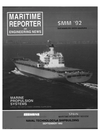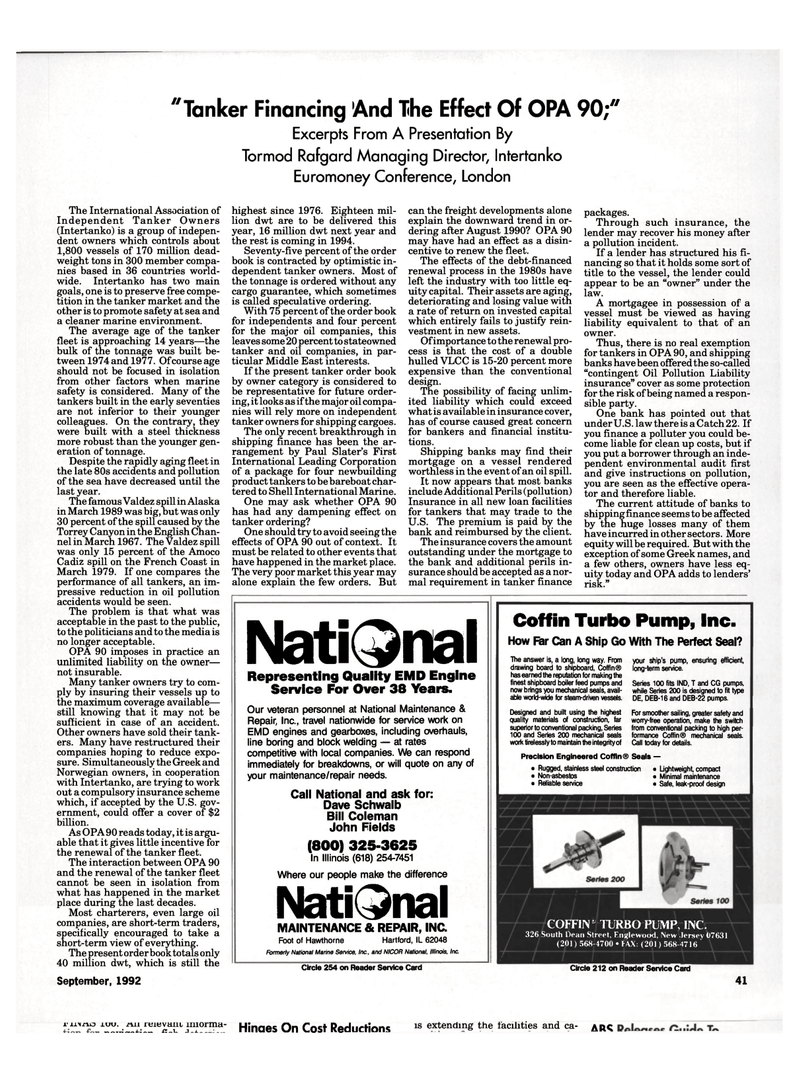
Page 41: of Maritime Reporter Magazine (September 1992)
Read this page in Pdf, Flash or Html5 edition of September 1992 Maritime Reporter Magazine
"Tanker Financing And The Effect Of OPA 90;"
Excerpts From A Presentation By
Tormod Rafgard Managing Director, Intertanko
Euromoney Conference, London
The International Association of
Independent Tanker Owners (Intertanko) is a group of indepen- dent owners which controls about 1,800 vessels of 170 million dead- weight tons in 300 member compa- nies based in 36 countries world- wide. Intertanko has two main goals, one is to preserve free compe- tition in the tanker market and the other is to promote safety at sea and a cleaner marine environment.
The average age of the tanker fleet is approaching 14 years—the bulk of the tonnage was built be- tween 1974 and 1977. Of course age should not be focused in isolation from other factors when marine safety is considered. Many of the tankers built in the early seventies are not inferior to their younger colleagues. On the contrary, they were built with a steel thickness more robust than the younger gen- eration of tonnage.
Despite the rapidly aging fleet in the late 80s accidents and pollution of the sea have decreased until the last year.
The famous Valdez spill in Alaska in March 1989 was big, but was only 30 percent of the spill caused by the
Torrey Canyon in the English Chan- nel in March 1967. The Valdez spill was only 15 percent of the Amoco
Cadiz spill on the French Coast in
March 1979. If one compares the performance of all tankers, an im- pressive reduction in oil pollution accidents would be seen.
The problem is that what was acceptable in the past to the public, to the politicians and to the media is no longer acceptable.
OPA 90 imposes in practice an unlimited liability on the owner— not insurable.
Many tanker owners try to com- ply by insuring their vessels up to the maximum coverage available— still knowing that it may not be sufficient in case of an accident.
Other owners have sold their tank- ers. Many have restructured their companies hoping to reduce expo- sure. Simultaneously the Greek and
Norwegian owners, in cooperation with Intertanko, are trying to work out a compulsory insurance scheme which, if accepted by the U.S. gov- ernment, could offer a cover of $2 billion.
As OPA 90 reads today, it is argu- able that it gives little incentive for the renewal of the tanker fleet.
The interaction between OPA 90 and the renewal of the tanker fleet cannot be seen in isolation from what has happened in the market place during the last decades.
Most charterers, even large oil companies, are short-term traders, specifically encouraged to take a short-term view of everything.
The present order book totals only 40 million dwt, which is still the
September, 1992 highest since 1976. Eighteen mil- lion dwt are to be delivered this year, 16 million dwt next year and the rest is coming in 1994.
Seventy-five percent of the order book is contracted by optimistic in- dependent tanker owners. Most of the tonnage is ordered without any cargo guarantee, which sometimes is called speculative ordering.
With 75 percent of the order book for independents and four percent for the major oil companies, this leaves some 20 percent to stateowned tanker and oil companies, in par- ticular Middle East interests.
If the present tanker order book by owner category is considered to be representative for future order- ing, it looks as if the major oil compa- nies will rely more on independent tanker owners for shipping cargoes.
The only recent breakthrough in shipping finance has been the ar- rangement by Paul Slater's First
International Leading Corporation of a package for four newbuilding product tankers to be bareboat char- tered to Shell International Marine.
One may ask whether OPA 90 has had any dampening effect on tanker ordering?
One should try to avoid seeing the effects of OPA 90 out of context. It must be related to other events that have happened in the market place.
The very poor market this year may alone explain the few orders. But can the freight developments alone explain the downward trend in or- dering after August 1990? OPA 90 may have had an effect as a disin- centive to renew the fleet.
The effects of the debt-financed renewal process in the 1980s have left the industry with too little eq- uity capital. Their assets are aging, deteriorating and losing value with a rate of return on invested capital which entirely fails to justify rein- vestment in new assets.
Of importance to the renewal pro- cess is that the cost of a double hulled VLCC is 15-20 percent more expensive than the conventional design.
The possibility of facing unlim- ited liability which could exceed what is available in insurance cover, has of course caused great concern for bankers and financial institu- tions.
Shipping banks may find their mortgage on a vessel rendered worthless in the event of an oil spill.
It now appears that most banks include Additional Perils (pollution)
Insurance in all new loan facilities for tankers that may trade to the
U.S. The premium is paid by the bank and reimbursed by the client.
The insurance covers the amount outstanding under the mortgage to the bank and additional perils in- surance should be accepted as a nor- mal requirement in tanker finance packages.
Through such insurance, the lender may recover his money after a pollution incident.
If a lender has structured his fi- nancing so that it holds some sort of title to the vessel, the lender could appear to be an "owner" under the law.
A mortgagee in possession of a vessel must be viewed as having liability equivalent to that of an owner.
Thus, there is no real exemption for tankers in OPA 90, and shipping banks have been offered the so-called "contingent Oil Pollution Liability insurance" cover as some protection for the risk of being named a respon- sible party.
One bank has pointed out that under U.S. law there is a Catch 22. If you finance a polluter you could be- come liable for clean up costs, but if you put a borrower through an inde- pendent environmental audit first and give instructions on pollution, you are seen as the effective opera- tor and therefore liable.
The current attitude of banks to shipping finance seems to be affected by the huge losses many of them have incurred in other sectors. More equity will be required. But with the exception of some Greek names, and a few others, owners have less eq- uity today and OPA adds to lenders' risk." 41
NatiQnal
Representing Quality EMD Engine
Service For Over 38 Years.
Our veteran personnel at National Maintenance &
Repair, Inc., travel nationwide for service work on
EMD engines and gearboxes, including overhauls, line boring and block welding — at rates competitive with local companies. We can respond immediately for breakdowns, or will quote on any of your maintenance/repair needs.
Call National and ask for:
Dave Schwalb
Bill Coleman
John Fields (800) 325-3625
In Illinois (618) 254-7451
Where our people make the difference NatiQnal
MAINTENANCE & REPAIR, INC
Foot of Hawthorne Hartford, IL 62048
Formerly National Marine Service, Inc., and NICOR National, Illinois, Inc.
Coffin Turbo Pump, Inc.
How Far Can A Ship Go With The Perfect Seal?
Circle 254 on Reader Service Card
The answer is, a long, long way. From drawing board to shipboard, Coffin® has earned the reputation for making the finest shipboard boiler feed pumps and now brings you mechanical seals, avail- able world-wide for steam-driven vessels.
Designed and built using the highest quality materials of construction, far superior to conventional packing, Series 100 and Series 200 mechanical seals work tirelessly to maintain the integrity of your ship's pump, ensuring efficient, long-term service.
Series 100 fits IND, T and CG pumps, while Series 200 is designed to fit type
DE, DEB-16 and DEB-22 pumps.
For smoother sailing, greater safety and worry-free operation, make the switch from conventional packing to high per- formance Coffin® mechanical seals.
Call today for details.
Precision Engineered Coffin® Seals — • Rugged, stainless steel construction • Lightweight, compact • Non-asbestos • Minimal maintenance • Reliable service Safe, leak-proof design
Circle 212 on Reader Service Card
COFFIN? TURBO PUMP, INC. 326 South Dean Street, Englewood, New Jersey 07631 (201) 568-4700 • FAX: (201) 568-4716 ' r ni^io iuu. .tt.ii relevant miorma- :—a:— J _A_ ___ Hinaes On Cost Reductions is extending the facilities and ca- ARC

 40
40

 42
42
